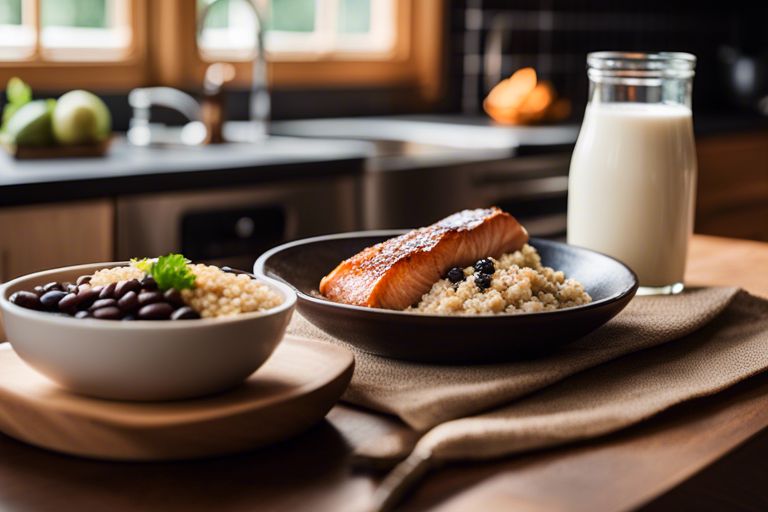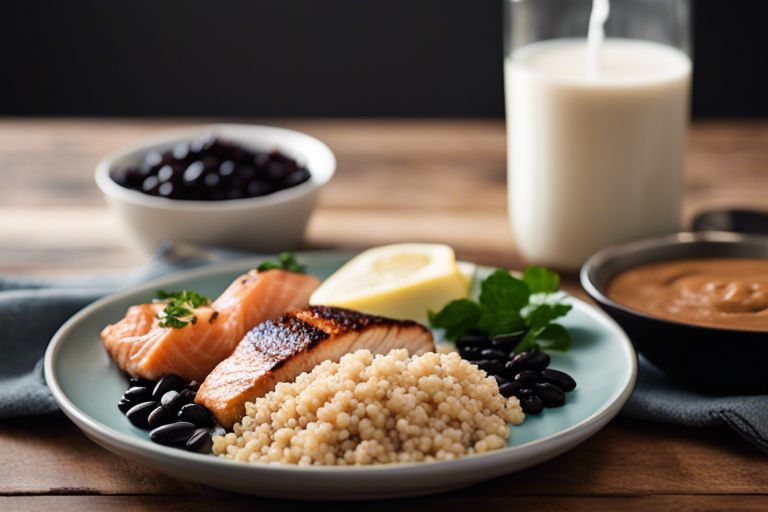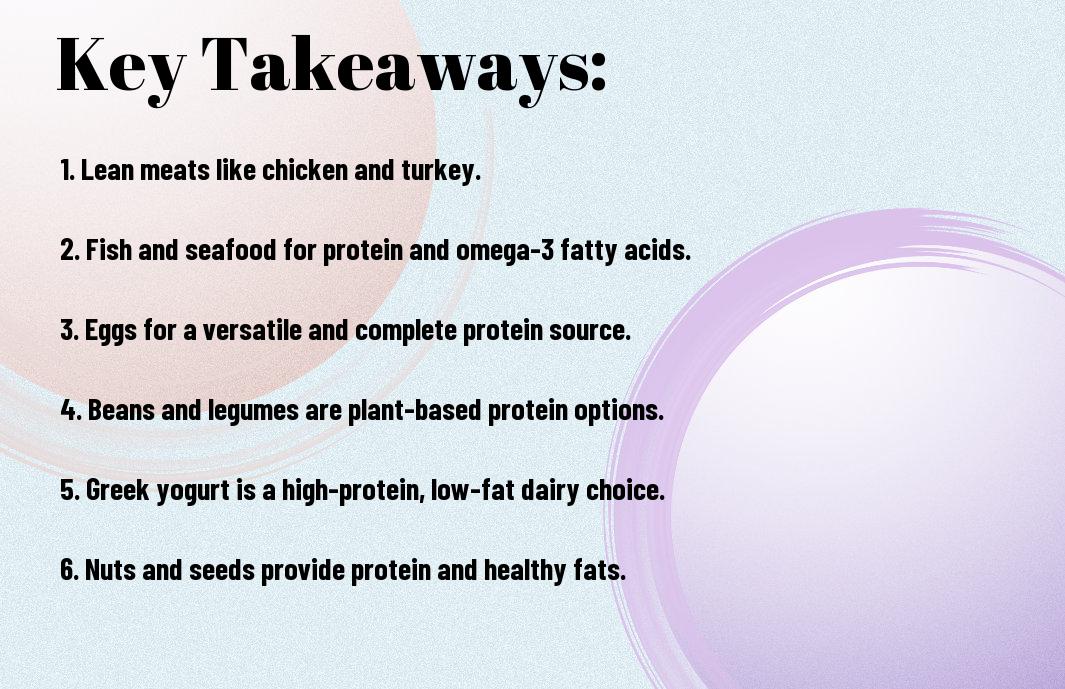Protein plays a crucial role in your diet, aiding in muscle growth, repair, and overall health. Including a variety of protein sources in your meals is crucial. You can find good sources of protein in foods like lean meats, poultry, fish, eggs, dairy products, and plant-based options such as quinoa and tofu. For more ideas on high-protein foods, check out this list of 16 Foods for High Protein Meals. Fuel your body with these nutritious options to support your health and well-being.
Key Takeaways:
- Animal meats: Sources such as chicken, beef, and turkey are high in protein and important nutrients.
- Seafood: Fish like salmon, tuna, and shrimp, are not only rich in protein but also provide healthy fats.
- Legumes: Beans, lentils, and chickpeas are plant-based sources of protein that are also high in fiber.

Animal-Based Protein Sources
The consumption of animal-based protein sources can be an imperative part of your diet, providing a high-quality protein rich in imperative amino acids. Here are some great sources of animal-based protein that you can incorporate into your meals.
Lean Meats
The inclusion of lean meats such as chicken, turkey, and lean cuts of beef can be a great way to boost your protein intake. These meats are not only rich in protein but also contain important nutrients such as iron and zinc. When preparing your meats, opt for healthier cooking methods such as grilling, baking, or broiling to keep them low in saturated fats and calories.
Seafood
Seafood, including fish such as salmon, tuna, and trout, can be a delicious and nutritious source of animal-based protein. Fish is not only rich in protein but also packed with omega-3 fatty acids, which are beneficial for heart health. Including a variety of fish and seafood in your diet can provide you with a range of nutrients and support your overall well-being.
Protein from fish and seafood is easily digestible and can be a lighter option compared to other animal-based proteins. To reap the most benefits, aim to include fish in your meals at least twice a week to meet your protein needs and promote good health.

Plant-Based Protein Sources
While animal products are popular sources of protein, plant-based sources can also provide you with the protein you need. They are not only nutritious but also have the added benefits of being high in fiber, vitamins, and minerals. Incorporating plant-based proteins into your diet can help diversify your nutrient intake and support overall health.
Legumes
Protein-rich legumes such as lentils, chickpeas, and black beans are excellent plant-based sources of protein. They are also high in fiber, making them a filling and satisfying option for your meals. Including legumes in your diet can help you meet your protein needs while promoting digestive health and providing crucial nutrients.
Nuts and Seeds
Nuts and seeds, such as almonds, chia seeds, and pumpkin seeds, are packed with protein, healthy fats, and various vitamins and minerals. They make a convenient and delicious snack option that can help boost your protein intake throughout the day. Including a variety of nuts and seeds in your diet can provide you with crucial nutrients and contribute to overall well-being.
Plus, nuts and seeds are versatile ingredients that can be added to salads, smoothies, or oatmeal. You can also enjoy nut butters or seed spreads as a tasty and nutritious addition to your meals. By incorporating nuts and seeds into your diet, you can create flavorful dishes while reaping the benefits of their protein and nutrient content.
Dairy and Eggs
All dairy and eggs are excellent sources of protein for your diet. They are versatile ingredients that can be used in a variety of dishes and meals to help meet your daily protein needs.
Milk and Cheese
All dairy products, such as milk and cheese, are rich in protein and can be easily incorporated into your daily meals. Milk is not only a good source of protein but also provides crucial nutrients like calcium and vitamin D. Cheeses, such as cheddar, mozzarella, and Swiss, are also packed with protein and add delicious flavor to your dishes.
Eggs
Eggs are a complete protein source, meaning they contain all the crucial amino acids your body needs. They are versatile and can be enjoyed in numerous ways – scrambled, boiled, poached, or as an omelet. Eggs also provide important nutrients like vitamin B12 and selenium.
With their high protein content and versatility in cooking, eggs are a convenient and nutritious option to add to your diet. They can be a quick and easy protein source for breakfast, lunch, or dinner, helping you meet your daily protein requirements while enjoying delicious meals.
Protein-Rich Grains
After lean meats and dairy, grains can also be a good source of protein. Protein-rich grains like quinoa and amaranth offer a plant-based alternative to animal protein sources. They are not only rich in protein but also packed with important nutrients and minerals.
Quinoa
An ancient grain, quinoa is a complete protein source, meaning it provides all nine important amino acids that your body cannot produce on its own. This makes it an excellent choice for vegetarians and vegans looking to meet their protein needs. Quinoa is also high in fiber, iron, magnesium, and antioxidants, making it a wholesome addition to your diet.
Amaranth
Protein-rich amaranth is another grain that offers a good amount of protein per serving. It is also gluten-free, making it a suitable option for those with gluten sensitivities. Amaranth is a good source of lysine, an important amino acid that is often lacking in other grains. Additionally, it contains important minerals like calcium, iron, and phosphorus.
Another benefit of amaranth is its versatility in the kitchen. You can use it to make porridge, salads, soups, or even bake it into bread and muffins. Adding amaranth to your diet can help increase your protein intake and provide a nutrient boost to your meals.
Soy Products
Keep in mind that soy products are a great source of plant-based protein. They are versatile and can be easily incorporated into your meals. Two popular soy products that you can include in your diet are tofu and tempeh.
Tofu
To start, tofu is a staple in many vegetarian and vegan diets. It is made from condensed soy milk that is pressed into solid white blocks. Tofu has a subtle flavor on its own, making it a versatile ingredient that can take on the flavors of the dish you are preparing. Whether you scramble it for breakfast, marinate it for a stir-fry, or blend it into a smoothie, tofu is a fantastic source of protein that can be enjoyed in various ways.
Tempeh
On the other hand, tempeh is another soy product that is gaining popularity for its nutty flavor and firm texture. Unlike tofu, tempeh is made from fermented soybeans that are pressed into a dense cake. This fermentation process not only enhances its flavor but also increases its digestibility and nutrient absorption. Tempeh is a great option if you are looking to switch up your protein sources and add a new depth of flavor to your meals.
Apart from being rich in protein, tempeh is also a good source of probiotics, which are beneficial for gut health. Including tempeh in your diet can help support a healthy digestive system and promote overall well-being. Try incorporating tempeh into stir-fries, salads, sandwiches, or even grilling it for a delicious meat alternative.
Other Good Sources of Protein
Meat Alternatives
Not a fan of meat? No problem! There are plenty of plant-based options that are great sources of protein. Foods like tofu, tempeh, edamame, and seitan are all rich in protein and can be delicious additions to your meals. These meat alternatives not only provide you with the protein you need but also offer a variety of necessary nutrients like iron, calcium, and healthy fats.
Protein Powder
Powder
This convenient option is a quick and easy way to boost your protein intake. Protein powders come in various forms, including whey, soy, pea, and rice protein. They can be added to smoothies, oatmeal, or even baked goods to increase the protein content of your meal. Protein powders are especially popular among athletes and those with busy lifestyles who may struggle to get enough protein from whole foods alone.

Final Words
From above, you now have a better understanding of what 6 good sources of protein are. Remember to incorporate a variety of these sources into your diet to ensure you are getting all the crucial amino acids your body needs to function properly. Whether you prefer animal-based proteins like eggs and fish, or plant-based options like tofu and quinoa, there are plenty of delicious and nutritious ways to meet your protein needs.
By making conscious choices about the foods you consume, you can optimize your health and well-being. Experiment with different protein sources to keep your meals exciting and diverse while nourishing your body with the crucial nutrients it needs. With knowledge about these 6 good sources of protein, you can make informed decisions that support your overall health and vitality.
FAQ
Q: What are 6 good sources of protein?
A: There are many great sources of protein, here are six of them:
- Fish – Fish like salmon, tuna, and sardines are high in protein and also provide healthy omega-3 fatty acids.
- Chicken – Chicken is a lean source of protein that can be prepared in a variety of ways.
- Eggs – Eggs are a versatile and affordable source of protein, with one large egg containing about 6 grams of protein.
- Beans – Beans, such as black beans, chickpeas, and lentils, are plant-based sources of protein that are also high in fiber.
- Greek Yogurt – Greek yogurt is a creamy and satisfying source of protein, with around 17 grams of protein per 6-ounce serving.
- Quinoa – Quinoa is a complete protein, meaning it contains all nine necessary amino acids, making it a great option for vegetarians and vegans.
Q: Why is protein important?
A: Protein is an necessary nutrient that plays a crucial role in the growth, repair, and maintenance of tissues in the body. It is also important for the production of enzymes, hormones, and antibodies. Getting an adequate amount of protein in your diet can help you feel full and satisfied, support muscle growth and repair, and promote overall health.
Q: How much protein do I need per day?
A: The recommended daily allowance (RDA) for protein is 0.8 grams per kilogram of body weight, or about 0.36 grams per pound. However, individual protein needs can vary based on factors such as age, sex, activity level, and goals. Most people can meet their protein needs by including a source of protein at each meal and snack throughout the day.